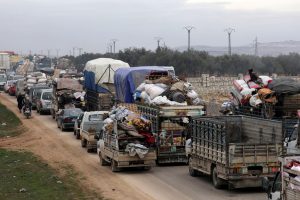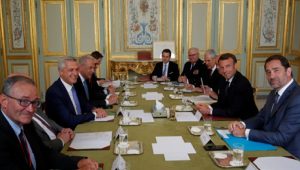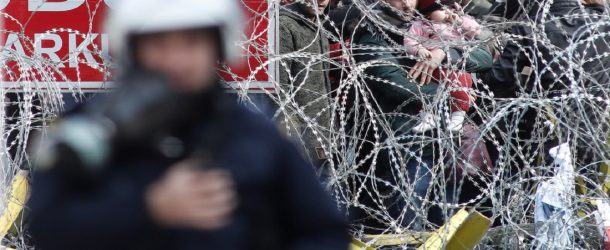It will be four years soon from the conclusion of the migration agreement between the European Union and Turkey. After an air attack on the Idlib region in north-western Syria by the troops of the Bashar al-Assad regime, with the participation of Russian forces, Turkish President Recep Erdogan, regardless of the agreement with the EU, in the last days of February 2020 decided to pass refugees through the territory Turkey.[1] This decision forces the European Union to re-review its approach to migration and asylum policy.
The current state of implementation of the EU-Turkey agreement on migration
The EU and Turkey agreed the migrants deal on March 18, 2016. The aim of the agreement was to eliminate illegal smuggling of migrants by organized crime groups and to offer migrants a non-risky solution and health while crossing the sea. The EU was primarily concerned with stopping the flow of immigrants to Europe. The agreement assumed that every irregular migrant who crosses the Greek-Turkish border on the Greek islands would be sent back to Turkey in accordance with European and international law. It was mainly about people who could not apply for asylum in Greece, and the EU took the costs of organizing ‘returns’ to Turkey. In addition, for each Syrian who was ordered to return to Turkey, the parties to the agreement were to relocate another Syrian from Turkey to the EU. Priority in the resettlement procedure was granted to those migrants who had not previously tried to illegally cross the border with the EU. In addition, the EU allocated EUR 6 billion to help refugees in Turkey, payable in two tranches in the form of financial support for projects, including in the field of health and education. Turkey has committed itself to preventing new migration routes. The agreement also provided for the liberalization of the visa regime for Turkish citizens “at the latest at the end of June 2016, provided that all the criteria are met”.
Despite the temporary nature of the agreement, it was treated as a success for EU diplomacy, although it was decided to cooperate with the EU’s neighboring countries only when it became clear that the Member States would not reach an agreement on this matter. It is worth adding that the agreement with Turkey was not an international agreement in a legal sense, but rather a political statement on cooperation. This form of cooperation indicated, on the one hand, the assumed temporary nature of the obligations (the agreement referred to “temporary and extraordinary measures”), and on the other, raised expectations for a future and long-term solution. This, in turn, depended to a large extent on the agreement of EU Member States on the issue of migration policy, which has not been achieved yet.
The decision to enable migrants to move towards Europe was motivated by President Recep Tayyip Erdoğan both by overloading the Turkish migration system and by the alleged failure of the EU to comply with the agreement. In his opinion, financial aid from Europe came too late and, in addition, it was directed to humanitarian organizations and not directly transferred to the Turkish budget. The pretext for Erdoğan’s controversial decision was the death of several dozen Turkish soldiers as a result of an air attack in Idlib. The decision to “open the border” has been recognized throughout the EU as part of Ankara’s policy of pressure on Western allies to obtain their support for Turkey’s military operations in Syria.
Regarding the state of implementation of the migration agreement, the problem was not so much the EU’s refusal to pay the promised funds, as suggested by the Turkish side, but rather the failure of the resettlement agreement element. Humanitarian organizations and reporters stationed on the Greek islands have repeatedly reported the need for migrants to wait long for asylum decisions, often in poor conditions. It is the overload of the Greek asylum system, forced to face the thousands of migrants currently waiting at the border that have been passed through Turkish territory, Athens is explaining its hard and persistent response to current events. It is also known that the budget set in 2016 has already been allocated to individual projects that will end in the coming months. In order to maintain the agreement with Turkey, further negotiations within the EU will be necessary on the use of additional funds.
Response of the EU diplomacy on current crisis
Not only humanitarian organizations, but also slightly belated European politicians informed about the deteriorating situation in the region. On February 20, 2020, in a telephone conversation with Vladimir Putin, Chancellor Angela Merkel and President Emmanuel Macron expressed their concern over the situation in Idlib.[2] At the same time, they declared their willingness to participate in further international debate aimed at resolving the conflict. However, it cannot be denied that nothing has mobilized Europe to take up the Syrian theme as much as migrants passed through Turkey and heading towards Europe. According to press information, in addition to the Syrians, this group included many Afghans, Pakistanis and Moroccans who had been in camps in the territory of Turkey for some time.[3]
Although Erdoğan’s decision led to a visit of high EU representatives on the Greek-Turkish border, a discussion of EU interior ministers in Brussels and an extraordinary meeting in Zagreb, none of these actions resulted in decisions solving the problem. Brussels’ reaction was therefore called crisis diplomacy, which meant their reactive nature. A commitment was made, above all, to provide financial support to Greece and to strengthen the presence of Frontex officers at the border, which was to improve asylum procedures. Additional resources have also been allocated to humanitarian aid in Syria. There were numerous assurances from Brussels for support for Greece and recognition of its key role in securing the EU’s external borders. Compared to 2015, some militarization of the migration problem could be felt in the EU debate on events on the Turkish border. This is demonstrated not only by the involvement of the army and general staff in crisis management in countries such as Bulgaria or Greece, but also by the rhetoric used by European politicians – ‘threat’ was more and more often discussed at the EU’s external borders.[4].

On the one hand, Brussels support for the Greek authorities’ actions can prove the community’s tough stance towards Turkey. On the other hand, these EU responses can be treated as an admission of failure on many fronts. It did not learn from the migration crisis of 2015-2016 and did not move matters related to the Community migration and asylum policy forward. It is worth recalling that there are currently over 40,000 on the Greek islands refugees who arrived in Europe at different times.
Although in the first days after President Erdoğan’s decision in the EU refrained from harsh criticism, dissatisfaction with political blackmail was expressed as unacceptable. However, after the informal meeting of EU Defense Ministers that took place on March 4 and 5 this year in Zagreb, the High Representative of the Union for Foreign Affairs and Security Policy Joseph Borrell talked about the need to “restart” relations between the EU and Turkey. At the same time, he pointed to the need to influence the other side of the conflict in Syria, where Russia is also involved – another difficult partner for talks. EU representatives strongly rejected the possibility of direct military activity in Syria. Borrell said the only way available to influence the situation is to use the UN and NATO, which definitively ruled out greater involvement in the Syrian conflict. In the case of the UN, Russia’s consent is required. Many European leaders (including Angela Merkel) are in favor of creating a safe zone in Syria, where refugees will be able to benefit from humanitarian aid. EU leaders are of the opinion that the first step should be to negotiate with Turkey on the further implementation of the 2016 agreement.[5] On March 17 this year, another meeting was planned in Istanbul with the participation of Erdoğan, Merkel and Macron. Instead of classical summit Turkish leader Recep Tayyip Erdogan held a video conference call with France’s Emmanuel Macron, Germany’s Angela Merkel and Britain’s Boris Johnson today to discuss the Syrian refugee crisis, Libya and the coronavirus pandemic. The mini summit was meant to take place in Istanbul, but was held virtually instead because of the travel restrictions stemming from the spread of the virus.[6]
Critical reference was also made to the EU’s tacit approval of Greece’s decision to suspend asylum law for one month. The sense of political “bargaining” with Erdoğan was also questioned, because in this way the EU gives a signal that it is able to turn a blind eye to the oppression of the Turkish system in the name of achieving tangible benefits associated with the agreement, which compromises EU values.
The future of European migration policy?
No further progress was made in discussions within the EU on the reform of the Dublin asylum system at the end of 2018. During the migration crisis of 2015-2016, the criterion of the country of priority entry due to the excessive burden on countries located in the south-eastern edges of the EU did not work, in particular. Hence, at the end of 2019, the President of the European Commission Ursula von der Leyen, pressed for a new European solution. Proposals for changes in European asylum policy have been announced for the first quarter of 2020.[7] In view of the new challenges that the pandemic coronavirus has brought with it, it is possible, however, to postpone talks on this topic to a different date.
Due to the lack of solidarity within the EU in the area of asylum policy, the President of the EC welcomed the information about the expansion of the “coalition of volunteers”, i.e. the number of countries that want to accept refugees currently on the Greek islands[8]. These include France, Ireland, Finland, Portugal, Luxembourg and Croatia. EU Home Affairs Commissioner Ylva Johansson is in talks with other Member States on this matter.[9]

Special Envoy of the UNHCR for the Central Mediterranean situation, a meeting on migration at the Elysee Place in Paris, France, 22 July 2019 [Poll/EPA/EFE].
According to Croatia, that hold Presidency of the EU Council in the first part of the 2020, EU-Turkey migration deal should be renewed. Croatian President Zoran Milanović revealed on 2 March that he had agreed with Prime Minister Andrej Plenković to convene a National Security Council soon because of a potential new migrant wave, but stressed he does not expect the crisis to happen. The president stressed referring to the migrant crisis of that year: “My assessment is that it will not be anything like 2015, but we must be prepared”. Moreover, on January 10, 2020 in Zagreb the Croatian and German Presidencies of the European Union in 2020 present opportunities to improve refugee protection, primarily by reforming the asylum system and providing greater support to the countries where most refugees live, the United Nations refugee agency (UNHCR) saidon the occasion of the start of Croatia’s presidency of the Council of the EU.[10]
Migration crisis management according to Croatian Presidency:
The Croatian Presidency assumed work towards comprehensive, effective and humane migration management on all migration routes. In addition to strengthening the system for the supervision of the EU’s borders, Croatia will continue to work on the establishment of a sustainable and efficient framework for the Common European Asylum System. To ensure the effective prevention of illegal migration and a more systematic implementation of the return policies, the Presidency will try to reach an agreement on the list of safe third countries and safe countries of origin. It will continue to work towards the consistent implementation of the readmission agreement and a more coherent implementation of economic, development-related, and other measures development-related, and other measures in cooperation with the countries of origin and transit of migrants.[11] Additionally, Croatia would like to work towards greater protection of the EU’s external borders, which is one of the key prerequisites for realizing the plan to restore the normal functioning of the Schengen area.
EU2020 HR’ assumptions:
- Present a new pact on migration and asylum,
- Create workable and sustainable migration policy for Europe,
- More bilateral meetings with Member States,
- Constructive approach from Member States,
- find a workable compromise to manage migration.[12]
Countries such as Austria, Cyprus, Poland and the Czech Republic offer a different way of involvement. They have sent additional Frontex officers, police officers and border guards to the Greek-Turkish border, or are planning to take such measures in the coming days. This situation confirms that the future of European migration policy is largely a choice between humanitarianism and consideration of migration from the point of view of EU security. Therefore, if next country that will hold Presidency of the EU Council in the second half of this year (Germany) wants to make the issue of regulating migration policy one of the priorities of its, it will not have an easy task.
Dr. Beata PISKORSKA
[1] David A. Wemer, “Tensions mount in Syria after strike on Turkish troops”, Atlantic Council, February 27, 2020, https://www.atlanticcouncil.org/blogs/new-atlanticist/tensions-mount-in-syria-after-strike-on-turkish-troops/; “Attack in Syria’s Idlib killed 33 Turkish soldiers: Hatay governor”, Reuters, February 28, 2020, https://www.reuters.com/article/us-syria-security-turkey-military-attack/attack-in-syrias-idlib-killed-33-turkish-soldiers-hatay-governor-idUSKCN20M030.
[2] R. Momtaz, “Macron and Merkel call Putin over Syria. As hundreds of thousands are displaced in bloody Idlib offensive, leaders talk, but do little else”, Politico, February 21, 2020, https://www.politico.eu/article/macron-and-merkel-call-putin-over-syria/.
[3] Agata Kałabunowska, “UE i Niemcy wobec sytuacji migracyjnej na granicy z Turcją”, Biuletyn Instytutu Zachodniego, Nr 10(430)/2020, 16.03.2020.
[4] Ibid.
[5] Ayhan Şimşek, “German chancellor pledges support for refugees in Idlib. Angela Merkel underlines importance of political solution in Syria”, AA, 17.03.2020, https://www.aa.com.tr/en/europe/german-chancellor-pledges-support-for-refugees-in-idlib/1769753
[6] Amberin Zaman, “Erdogan meets virtually with EU leaders under coronavirus cloud”, Al Monitor, March 17, 2020, https://www.al-monitor.com/pulse/originals/2020/03/erdogan-video-meeting-macron-merkel-johnson-syria-corona.html; Berk Ozkan, “Erdogan, Macron, Merkel to have video call amid fear of virus. eaders summit to address Idlib, refugee crisis, and Turkey-EU relations”, AA, 13.03.2020, https://www.aa.com.tr/en/latest-on-coronavirus-outbreak/erdogan-macron-merkel-to-have-video-call-amid-fear-of-virus/1765613.
[7] David A. Wemer, “Idlib presents Europe with another migration test”, Atlantic Council, March 10, 2020, https://www.atlanticcouncil.org/blogs/new-atlanticist/idlib-presents-europe-with-another-migration-test/.
[8] Georgi Gotev, “EU coalition of the willing agrees new migrant ‘solidarity mechanism”, EURACTIV.com with Reuters, 23.07.2019, https://www.euractiv.com/section/justice-home-affairs/news/eu-coalition-of-the-willing-agrees-new-migrant-solidarity-mechanism/.
[9] Karla Juničić, “EU-Turkey migration deal should be renewed, Croatia says”, EURACTIV, https://www.euractiv.com/section/justice-home-affairs/news/eu-turkey-migration-deal-should-be-renewed-croatia-says/.
[10] “A New Deal for Refugees”, https://www.unhcr.org/a-new-deal-for-refugees.html.
[11] “A strong Europe in a world of Challenges, 1 January – 30 June 2020, Programme of the Croatian Presidency of the Council of the European Union”, https://Vlada.Gov.Hr/Userdocsimages/Vijesti/2019/12%20prosinac/31%20prosinca/Web_Final_Programme_En_Final.Pdf.
[12] Press conference opening statement by Commissioner Ylva Johansson at informal Justice and Home Affairs Council (JHA), in Zagreb, Croatia24 January 2020, https://ec.europa.eu/commission/commissioners/2019-2024/johansson/announcements/press-conference-opening-statement-commissioner-ylva-johansson-informal-justice-and-home-affairs_en.

























































